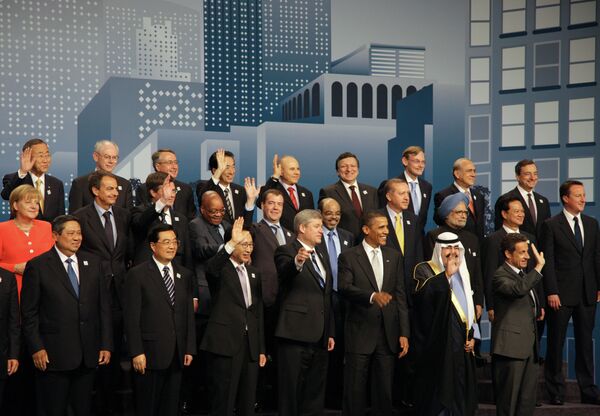The leaders of major economies that gathered in Toronto, Canada, for a G20 summit on Saturday and Sunday, agreed on the next steps to create sustainable and balanced growth and to reform and strengthen financial systems.
"We are taking strong steps toward increasing the stability and strength of our financial systems. Significantly increased resources for international financial institutions are helping stabilize and address the impact of the crisis on the world's most vulnerable," the leaders said in a G20 Toronto Summit Declaration.
"But serious challenges remain. While growth is returning, the recovery is uneven and fragile, unemployment in many countries remains at unacceptable levels, and the social impact of the crisis is still widely felt. Strengthening the recovery is key," the declaration said.
The G20 comprises the world's 19 biggest economies; the 20th member of the G20 is the European Union, while the International Monetary Fund (IMF), the World Bank and the European Central Bank also take part in the gatherings. The group accounts for 85% of the world GDP.
"To sustain recovery, we need to follow through on delivering existing stimulus plans, while working to create the conditions for robust private demand," it said, adding that there is also "a pressing need to complete the reforms of the international financial institutions."
The leaders expressed their adherence to the Framework for Strong, Sustainable and Balanced Growth launched at the Pittsburgh, Pennsylvania, summit in September 2009.
The joint statement said the IMF and the World Bank estimate that if "a more ambitious path of reforms" is chosen, then "global output would be higher by almost $4 trillion, tens of millions of new jobs would be created," up to 90 million people would be lifted out of poverty and "global imbalances would be significantly reduced" over the medium term.
Regarding specific measures, the G20 countries agreed that "advanced economies have committed to fiscal plans that will at least halve deficits by 2013 and stabilize or reduce government debt-to-GDP ratios by 2016."
"The International Financial Institutions (IFIs) have been a central part of the global response to the financial and economic crisis, mobilizing critical financing, including $750 billion by the IMF and $235 billion by the Multilateral Development Banks (MDBs)," the G20 members said.
"We commit to strengthening the legitimacy, credibility and effectiveness of the IFIs to make them even stronger partners for us in the future. Towards this end, we have fulfilled our Pittsburgh Summit commitment on the MDBs," they said.
"This includes $350 billion in capital increases for the MDBs, allowing them to nearly double their lending. This new capital is joined to ongoing and important reforms to make these institutions more transparent, accountable and effective, and to strengthen their focus on lifting the lives of the poor, underwriting growth, and addressing climate change and food security," the final declaration said.
The G20 leaders also agreed to fight protectionism and promote trade and investment.
"We renew for a further three years, until the end of 2013, our commitment to refrain from raising barriers or imposing new barriers to investment or trade in goods and services, imposing new export restrictions or implementing World Trade Organization (WTO)-inconsistent measures to stimulate exports, and commit to rectify such measures as they arise," they said.
"We will minimize any negative impact on trade and investment of our domestic policy actions, including fiscal policy and action to support the financial sector," the leaders said.
Regarding the Gulf of Mexico oil spill, the leaders said they "recognize the need to share best practices to protect the marine environment, prevent accidents related to offshore exploration and development, as well as transportation, and deal with their consequences."
Russian President Dmitry Medvedev said G20 member states agreed to jointly fight global drug trafficking.
"Our anti-drug departments will unite their efforts and we have agreed on active work with the government of Afghanistan to minimize all threats coming from this country," Medvedev told a news conference after the summit.
He said Afghan drug trafficking is a huge problem as the whole country is affected by this phenomenon.
"For the largest part of the population it is the only source of income and it is very hard to fight this, but it does not mean that we must give up saying that this is the only style of living and that is the way they have been living," Medvedev said.
Some 3.5 million Afghan peasants are involved in drug production, which is a major source of income for the impoverished population and Taliban militants alike.
Drug production has increased 40 times in Afghanistan since 2001. An estimated 90% of heroin consumed in Russia is trafficked from Afghanistan via the former Soviet republics of Tajikistan and Uzbekistan. According to expert estimates, Afghan drugs have killed more than 1 million Russians over the past 10 years.
A Russian presidential aide said Russia has proposed hosting the G20 summit in 2013 and the decision will be made this fall.
"We have proposed our candidacy for the G20 summit in 2013. The decision has not been made yet as Turkey also wants to host the summit," Arkady Dvorkovich told journalists after the G20 summit.
The first summit G20 summit was held in Washington in November 2008 as the extent of the global financial crisis became clear, with subsequent meetings in London in April 2009 and Pittsburgh, Pennsylvania, last September.
MOSCOW, June 28 (RIA Novosti)


